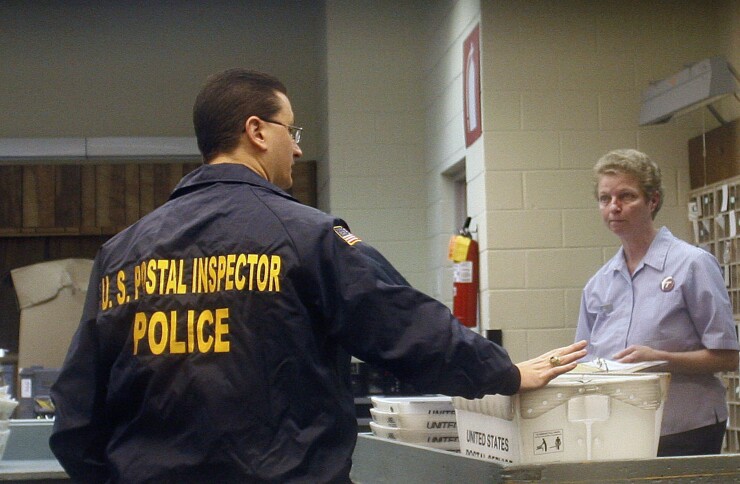
Check fraud has become so widespread that a majority of bank executives want regulators to take action to stop criminals from stealing paper checks. Many want law enforcement to make check fraud a bigger priority and for Congress to get involved.
In a survey published by fintech IntraFi Monday morning, bank executives confirm that check fraud is having a big impact on consumers, businesses and banks, undermining faith in the banking system and the U.S. Postal Service. In the latest IntraFi economic survey, 90% of bankers experienced an increase in check fraud over the past two to three years with nearly half saying check fraud is up more than 30%.
"Check fraud is high across the board and bankers are confirming it," said Paul Weinstein, senior policy advisor at IntraFi, an Arlington, Virginia-based fintech that helps banks manage their deposits and liquidity.
Weinstein, who was himself a victim of attempted check fraud, said he was shocked at just how bad the problem is. Nearly half of bankers surveyed said law enforcement needs to target check fraud as an issue, and 14% said that Congress should get involved.
"The confidence in the basic functioning of the financial marketplace is a core responsibility of the government and it impacts the economy at large," Weinstein said. "This strikes me as one of the few issues that some sort of solution could possibly happen because there should be bipartisan support here."
IntraFi's Bank Executive Business Outlook Survey provides insights into issues facing the nation's 4,000 banks. With 471 bank CEOs, presidents, chief financial officers and chief operating officers responding, the responses skew notably toward community banks. The survey, conducted online from July 1 to July 12, asked four questions about check fraud and another 10 about core bank topics such as loan demand, deposit competition, funding costs and access to capital.
Scams against banks and the increase in fraud and criminal schemes have led some experts to call for a more coordinated response from the government.
Nick Bourke, a consultant and policy advisor who served as an executive director at the Pew Charitable Trusts, said the federal government should consider eliminating or greatly constraining the use of paper checks. Last week, Bourke published independent research backed by the Consumer Bankers Association proposing
"The cost and difficulty of combating check fraud far exceeds the diminishing value that checks may continue to provide," Bourke said.
Congress could facilitate anti-fraud and scam information at a greater scale by making changes to the Patriot Act, Bourke said.
Frank Abagnale Jr., an expert on check forgery who inspired Steven Spielberg's film "Catch Me If You Can," said
"The federal government gave me 12 years in federal prison for interstate transportation of fraudulent checks," Abagnale said in a recent IntraFi interview. "If I was doing that today, it is unlikely I'd be prosecuted, unlikely I'd have bail posted and I'd probably end up with probation or community service."
In the IntraFi survey, bankers said they want action. Three out of five bankers want regulators to shift liability for check fraud to the bank of first deposit, where a customer deposits a check — but also where criminals open mule or drop accounts to facilitate check fraud.
More than 90% of respondents said their bank had difficulties or prolonged delays in getting repaid for a bad check by the bank of first deposit. The breakdown was high, with 41% saying delays in getting repaid are "very common," and 49% saying "it happens, but only occasionally."
Nearly 60% of bankers surveyed blamed megabanks for failing to reimburse for bad checks. Another 18% blamed large regional banks with between $250 billion and $699 billion in assets.
"It's a size issue, because the big banks process a large number of checks so it's not surprising that they will be cited as a big part of the problem," Weinstein said. "The question is: Are their standards not strong enough? Or is it that the bigger banks are processing so many checks at a time that it's challenging to manage?"
On the broader economic questions, bankers expect funding costs to drop going forward, with the Federal Reserve expected to lower interest rates. The vast majority, 83%, of bankers' funding costs are either significantly or moderately higher compared to a year ago. Yet 37% of bankers expect funding costs to moderately decrease in the year ahead.
Since bankers are sensitive to interest rates and inflation, they generally look to the future and don't like what they see. Nearly all bankers expect deposit competition to worsen in the next year, with 90% saying deposit competition is already at high levels and has gotten worse.
"Banks are feeling it," said Weinstein.






